We are proud to have received a Best Paper Award at this year’s ICPR. Please take a look at this article for more information: Machine Learning with Synthetic Data – Research Unit Augmented Vision receives Best Paper Award at ICPR 2022 (dfki.de)
We are pleased to announce that the Augmented Vision group presented two papers at the HCI International 2022 Conference from June 28th to July 1st, 2022.
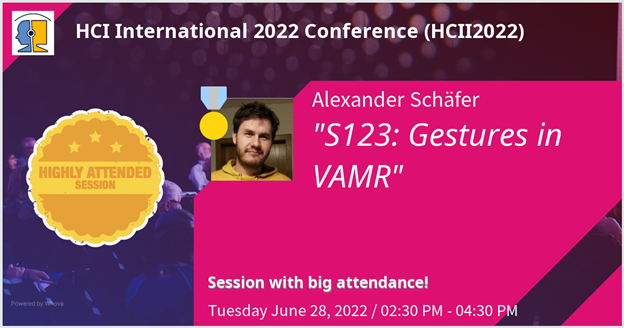
The two accepted papers are:
Title: Learning Effect of Lay people in Gesture-Based Locomotion in Virtual Reality
Authors: Alexander Schäfer, Gerd Reis, Didier Stricker
Abstract: Locomotion in Virtual Reality (VR) is an important part of VR applications. Many scientists are enriching the community with different variations that enable locomotion in VR. Some of the most promising methods are gesture-based and do not require additional handheld hardware. Recent work focused mostly on user preference and performance of the different locomotion techniques. This ignores the learning effect that users go through while new methods are being explored. In this work, it is investigated whether and how quickly users can adapt to a hand gesture-based locomotion system in VR. Four different locomotion techniques are implemented and tested by participants. The goal of this paper is twofold: First, it aims to encourage researchers to consider the learning effect in their studies. Second, this study aims to provide insight into the learning effect of users in gesture-based systems.
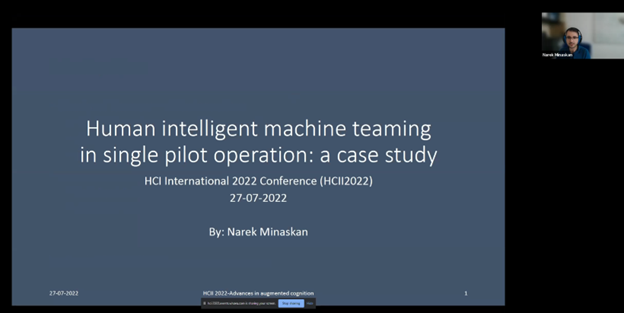
Title: Human intelligent machine teaming in single pilot operation: A case study
Authors: Nareg Minaskan Karabid, Charles-Alban Dormoy, Alain Pagani, Jean-Marc Andre, Didier Stricker
Abstract: With recent advances in artificial intelligence (AI) and learning based systems, industries have started to integrate AI components into their products and workflows. In areas where frequent testing and development is possible these systems have proved to be quite useful such as in automotive industry where vehicle are now equipped with advanced driver-assistant systems (ADAS) capable of self-driving, route planning, and maintaining safe distances from lanes and other vehicles. However, as the safety-critical aspect of task increases, more difficult and expensive it is to develop and test AI-based solutions. Such is the case in aviation and therefore, development must happen over longer periods of time and in a step-by-step manner. This paper focuses on creating an interface between the human pilot and a potential assistant system that helps the pilot navigate through a complex flight scenario. Verbal communication and augmented reality (AR) were chosen as means of communication and the verbal communication was carried out in a wizard-of-Oz (WoOz) fashion. The interface was tested in a flight simulator and its usefulness was evaluated by NASA-TLX and SART questionnaires for workload and situation awareness.
Please check out the article “Artificial intelligence for a safe and sustainable construction industry (dfki.de)” concerning the new EU project HumanTech which is coordinated by Dr. Jason Rambach, head of the Spatial Sensing and Machine Perception team (Augmented Reality/Augmented Vision department, Prof. Didier Stricker) at the German Research Center for Artificial Intelligence (DFKI) in Kaiserslautern.
We are happy to announce that our paper titled
Deep Orientation-Guided Gender Recognition from Face Images
Mohamed Selim, Stephan Krauß, Tewodros Amberbir Habtegebrial, Alain Pagani, Didier Stricker
has been accepted and presented (online) at the 12th International Conference on Pattern Recognition Systems, ICPRS-2022.
In this paper, we present a novel deep learning-based method to predict gender using both the face image and the head orientation angles. We show that the use of head orientation information consistently boosts the accuracy of gender prediction models. We achieve this by increasing the representational power of deep neural networks by introducing a head orientation adapter.
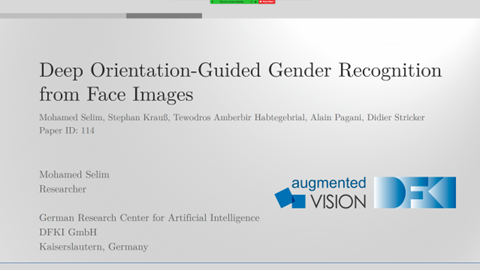

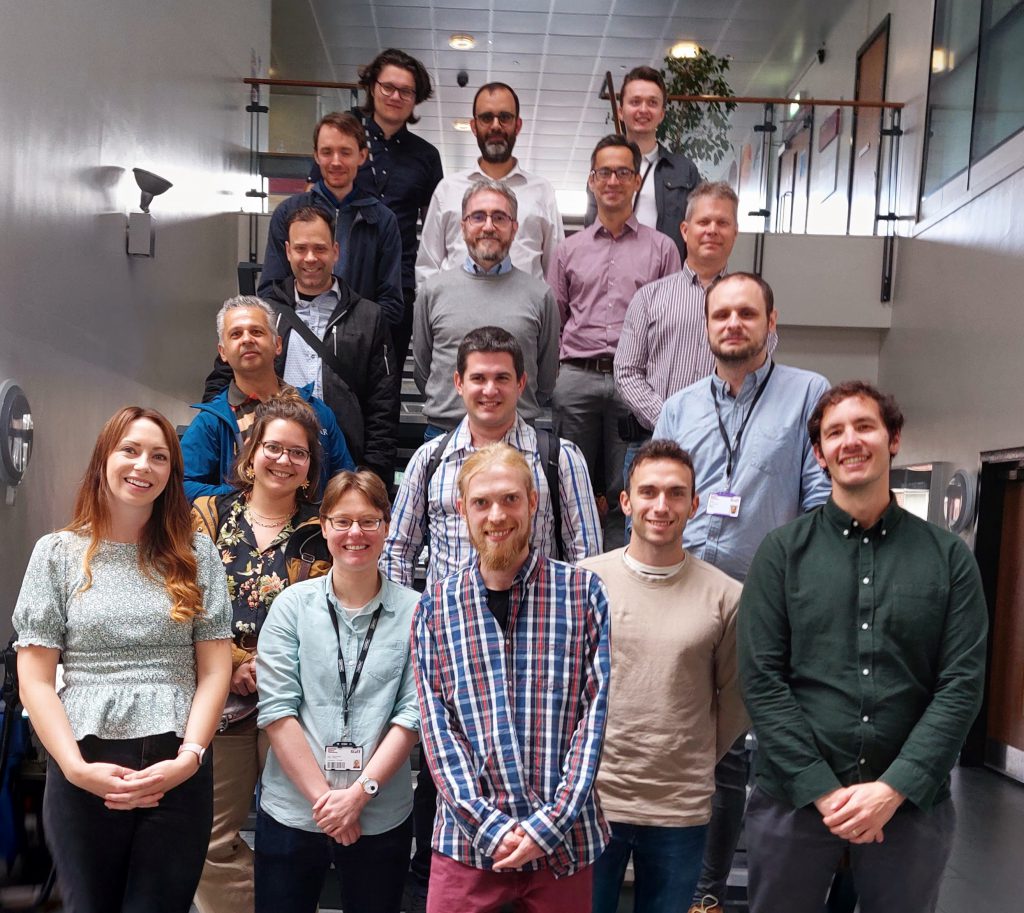
The INFINITY consortium had a successful technical meeting in preparation of the upcoming pilot in Sheffield, UK on July 5th, 2022.
The EU project INFINITY aim at delivering an integrated solution for data-driven criminal investigations, synthesising the latest innovations in virtual and augmented reality, artificial intelligence and machine learning with big data and visual analytics. The result of the project will be a platform for collaborative work between Law Enforcement Agencies, where teamwork will be facilitated in virtual spaces and supported by AI-based data analytics.
DFKI is partnering with 19 partners to deliver an innovative solution. DFKI is working on virtual representations and avatars systems, and on an AI-based assistant to help investigation work.
More information: https://h2020-infinity.eu/
Contact: Dr. Alain Pagani
DFKI Augmented Vision had a strong presence in the recent CVPR 2022 Conference held on June 19th-23rd, 2022, in New Orleans, USA. The IEEE/CVF Computer Vision and Pattern Recognition Conference (CVPR) is the premier annual computer vision event internationally. Homepage: https://cvpr2022.thecvf.com/ .
Overall, three publications were presented:
1. ZebraPose: Coarse to Fine Surface Encoding for 6DoF Object Pose Estimation
Yongzhi Su, Mahdi Saleh, Torben Fetzer, Jason Raphael Rambach, Nassir Navab, Benjamin Busam, Didier Stricker, Federico Tombari
2. SOMSI: Spherical Novel View Synthesis with Soft Occlusion Multi-Sphere Images Tewodros A Habtegebrial, Christiano Gava, Marcel Rogge, Didier Stricker, Varun Jampani
3. Unsupervised Anomaly Detection from Time-of-Flight Depth Images
Pascal Schneider, Jason Rambach, Bruno Mirbach , Didier Stricker
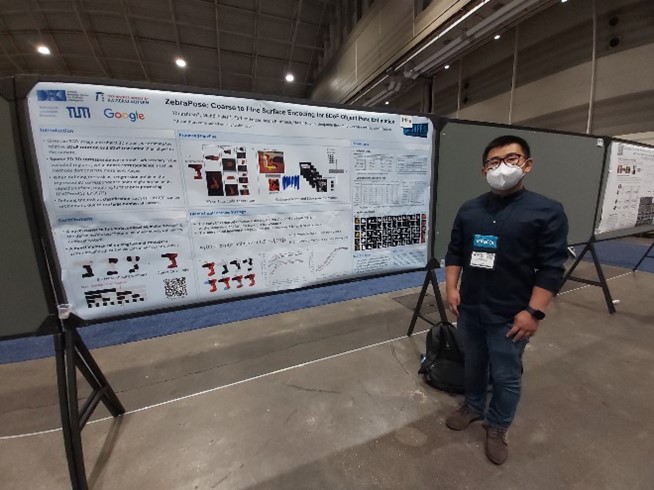
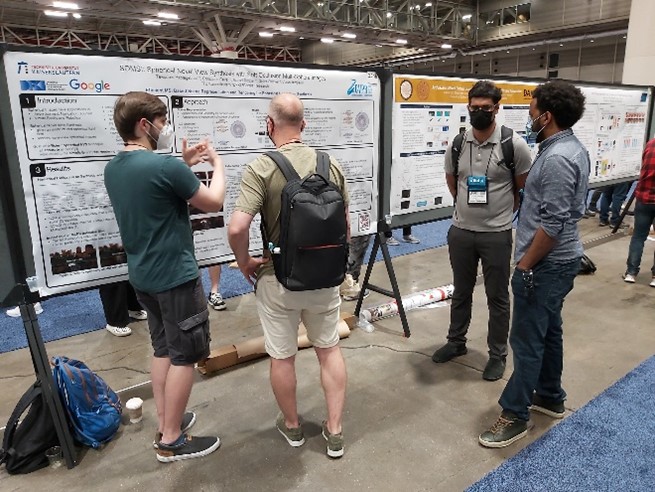
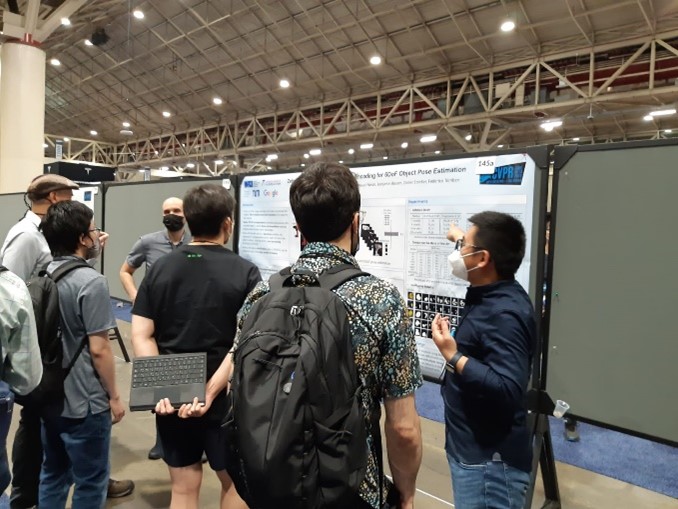
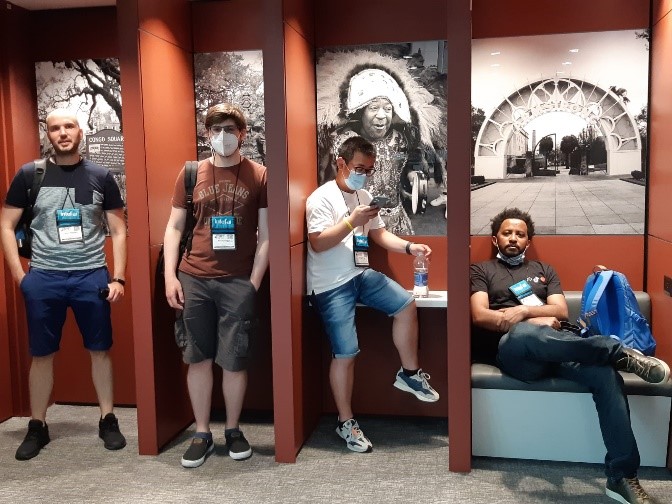
On June 14th, 2022, Dr. Jason Rambach gave a keynote talk in the Computer Vision session of the Franco-German Research and Innovation Network event held at the Inria headquarters in Versailles, Paris, France. In the talk, an overview of the current activities of the Spatial Sensing and Machine Perception team at DFKI Augmented Vision was presented.
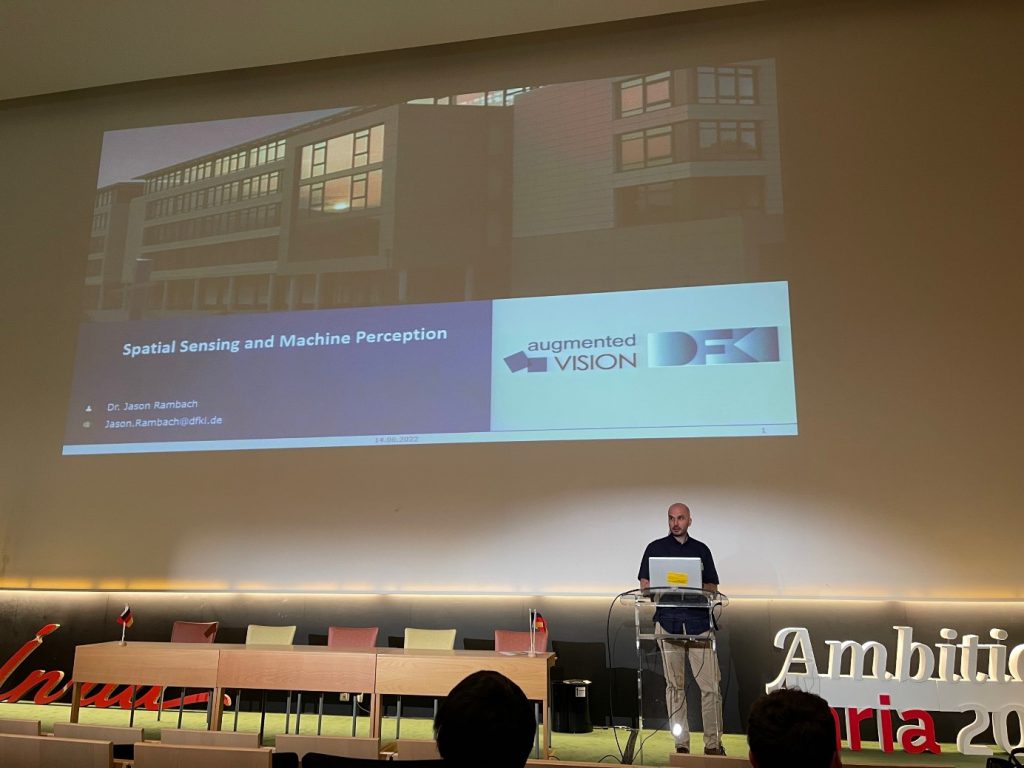
The project MOVEON has been presented by Dr. Alain Pagani (DFKI) and Romain Boisseau (INRIA) at the 6th edition of the Viva Technology fair in Paris on June 17th, 2022.
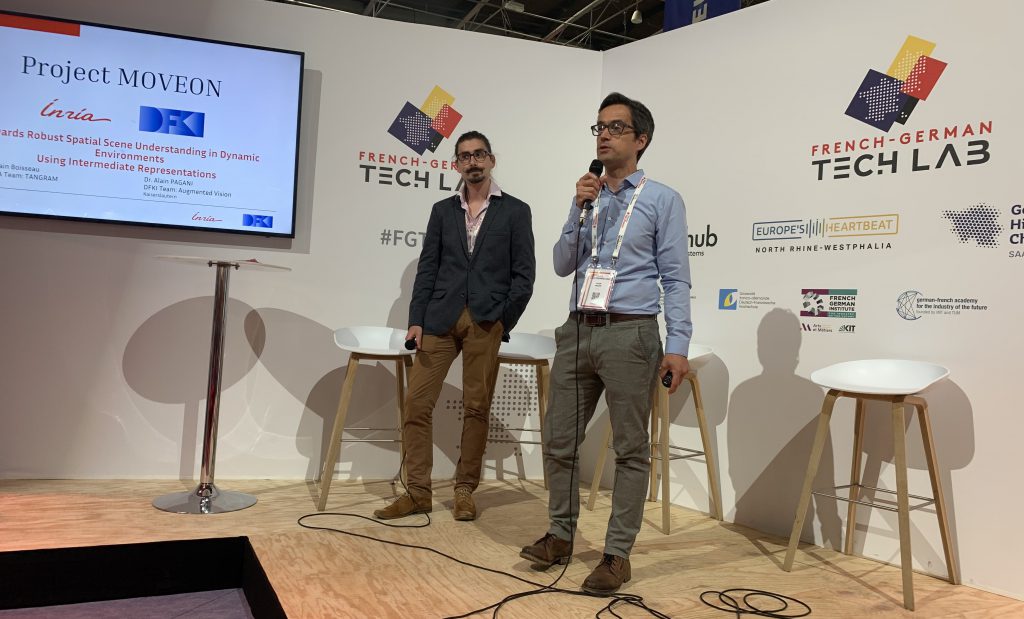
Viva Technology, or VivaTech, is an annual technology conference, dedicated to innovation and startups, held in Paris, France. This year, France and Germany have been showcasing their future European digital champions on a single stand: the French-German Tech Lab. This Lab, organized by twelve French and German partners, highlights the most promising startups in their ecosystems, as well as the concrete academic and economic cooperation between the two countries.
MOVEON is a common project between DFKI and INRIA, and is aiming to develop a new generation of visual positioning algorithms that will enable geometric reasoning to be carried out on high-level primitives taken from learning.
More information: https://www.dfki.de/web/forschung/projekte-publikationen/projekte-uebersicht/projekt/moveon
Contact: Dr. Alain Pagani
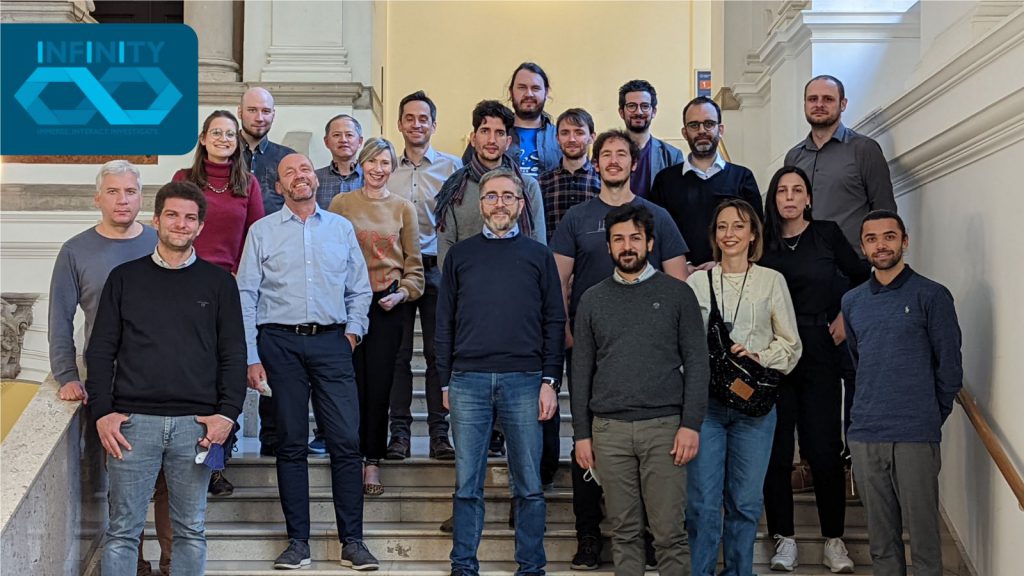
The EU project INFINITY has concluded its first in-person project meeting in Vienna on April 13th, 2022. This meeting was the occasion for the end user partners to try out the updated VR demos.
INFINITY aims at delivering an integrated solution for data-driven criminal investigations, synthesising the latest innovations in virtual and augmented reality, artificial intelligence and machine learning with big data and visual analytics. The result of the project will be a platform for collaborative work between Law Enforcement Agencies, where teamwork will be facilitated in virtual spaces and supported by AI-based data analytics.
More information: https://h2020-infinity.eu/
Contact: Dr. Alain Pagani
Artificial intelligence (AI) is serving an increasingly significant role in many workplaces — one that continues to grow as new developments in AI and surrounding technologies become available. This leads us to think about how such technologies can be and should be used to empower humans. In this article, Tomokazu Murakami from the Research & Development Group of Hitachi, Ltd. sat down with Didier Stricker, Head of the Augmented Reality Research Department at the German Research Center for Artificial Intelligence (DFKI) to discuss the use of AI in the workplace, its benefits and challenges, human-AI collaboration and its impact on workers.
Check out the full interview “Insights from AI/Analytics: Human-AI collaboration in the industrial sector: what does the future hold?”.
